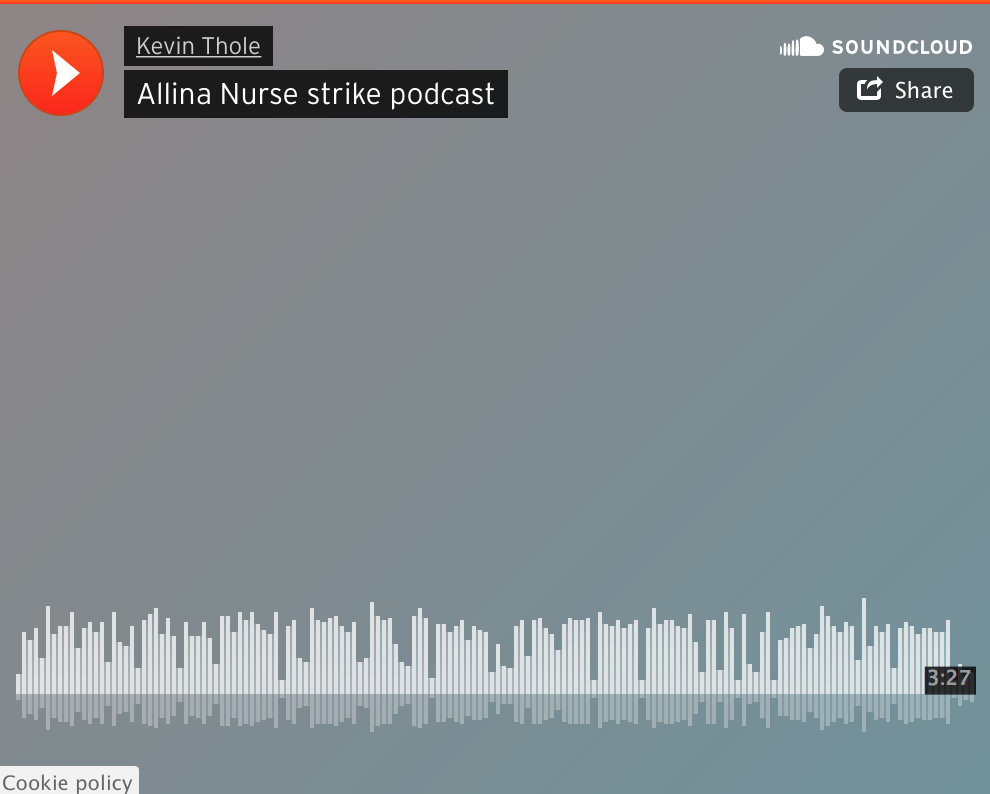Nurses Union stands up to Allina health officials, reaches settlement
October 13, 2016
The halls of Twin Cities hospitals may have seemed a little empty the past three weeks. Due to disputes with management, over 4000 nurses in five Allina Health hospitals have gone on strike. The Nurses Union began picketing the hospitals and have refused to go back to work unless their demands are met. The main of these is the blocking of an unfair change to the nurses health insurance plan. The Union is standing up for the hardworking Twin Cities nurses by respecting the nurses’ labor rights.
The strike has been going on since Labor Day. It began when relations between Allina Health Executives and the Nurses Union deteriorated after Allina decided to change nurses’ health insurance plan from a high-premium, low-deductible plan to a low-premium, high-deductible plan.
Schooling to become a registered nurse usually requires a bachelor’s degree in nursing plus a three-year nursing program and may cost anywhere from $5,000 or $20,000 a year depending on the school. Getting a degree in any medical field requires a lot of hard work.
But many nurses, including the school health care specialist Melissa Fischer, say it’s worth it. “I became a nurse because I wanted to help people and do it on a personal level,” Fischer said.
“I had to go back to school after getting my bachelor’s. The school itself was hard and I had to juggle it with raising three kids. however, the most rewarding part is to see the response of the students to the care I give them,” she added.
In order to compensate for the lack of nurses, the hospitals have brought in over 1,500 replacement nurses who are spread thin among the hospitals. The replacement nurses are expected to work six 12 hour shifts. This would make their work hours considerably longer than the regular nurses and along with these long work hours comes fatigue which can lead to mistakes being made. The Union states that these work conditions are unacceptable.
In an interview with the Pioneer Press, Union staff attorney Mat Keller was outraged at the long hours. “If a nurse came to me and said ‘Hey I’m working six 12 hour shifts in a row’ I would never say that’s okay. It’s completely unsafe for patients,” Keller stated.
Unions are the primary force protecting workers from employers and the right to unionize is one of the most important rights for workers. Unions usually watch out for workers in regard to salary, healthcare, paid leave, and wrongful termination. In the case of the Allina Union, they are protecting the Nurses healthcare plans which Allina hospitals decided to change without consulting the Union first. The new healthcare plan would help Allina hospitals save money, but its high deductibles would hurt nurses who have health issues or other reasons why they would need to use their health insurance. Ultimately, it’s the workers who should have the final say in this matter.
Allina Health and the nurses Union have been holding negotiations for the past month and it looks like they are close to agreeing on a deal. According to the Allina Health website, the hosptitals and the Union have agreed on lowering the deductibles of the proposed healthcare plan as well as other agreements such as increasing leave benefits, tuition reimbursement, and wage increases. The negotiations are in the finalizing process and it looks like the nurses will soon be going back to work.
It was important that Allina CEO Penny Wheeler agreed to a lot of the Union’s terms not only to respect workers’ rights, but also to bring the nurses back to work and relieve the strain on the hospitals and patients that the understaffing has caused.
Since the strike began, over 400 nurses have broke with the union and crossed the picket line. But, the workers in the hospitals are still considerably spread thin. For the sake of the hospital and the patients, Allina must listen to the union’s demands and work with them to bring an end to the strike.
